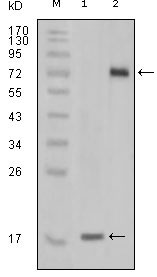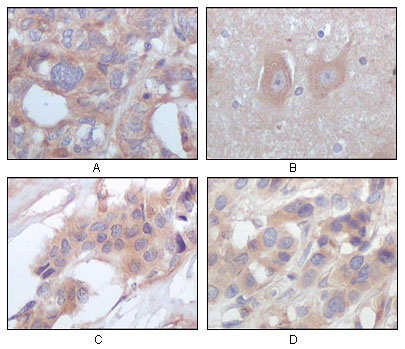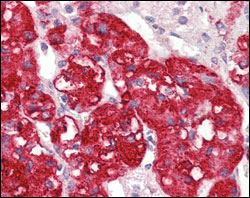STYK1 Antibody
Purified Mouse Monoclonal Antibody
- 产品详情
- 实验流程
Application
| WB, IHC, E |
|---|---|
| Primary Accession | Q6J9G0 |
| Reactivity | Human |
| Host | Mouse |
| Clonality | Monoclonal |
| Clone Names | 2H2F10 |
| Isotype | IgG1 |
| Calculated MW | 47577 Da |
| Description | Protein kinases (PKs) represent a well studied but most diverse protein superfamily. The covalent, reversible linkage of phosphate to serine, threonine, and tyrosine residues of substrate proteins by protein kinases is probably ubiquitous cellular mechanism for regulation of physiological processes. It is known to us that most signaling pathways impinge at some point on protein kinases. Here we report a human putative receptor protein kinase cDNA STYK1. The STYK1 cDNA is 2749 base pairs in length and contains an open reading frame encoding 422 amino acids. The STYK1 gene is mapped to human chromosome 12p13 and 11 exons were found. RT-PCR showed that STYK1 is widely expressed in human tissues. |
| Immunogen | Purified recombinant fragment of STYK1 expressed in E. Coli. |
| Formulation | Ascitic fluid containing 0.03% sodium azide. |
| Gene ID | 55359 |
|---|---|
| Other Names | Tyrosine-protein kinase STYK1, 2.7.10.2, Novel oncogene with kinase domain, Protein PK-unique, Serine/threonine/tyrosine kinase 1, STYK1, NOK |
| Dilution | WB~~1/500 - 1/2000 IHC~~1/500 - 1/2000 E~~N/A |
| Storage | Maintain refrigerated at 2-8°C for up to 6 months. For long term storage store at -20°C in small aliquots to prevent freeze-thaw cycles. |
| Precautions | STYK1 Antibody is for research use only and not for use in diagnostic or therapeutic procedures. |
| Name | STYK1 |
|---|---|
| Synonyms | NOK |
| Function | Probable tyrosine protein-kinase, which has strong transforming capabilities on a variety of cell lines. When overexpressed, it can also induce tumor cell invasion as well as metastasis in distant organs. May act by activating both MAP kinase and phosphatidylinositol 3'-kinases (PI3K) pathways (By similarity). |
| Cellular Location | Membrane; Single-pass membrane protein |
| Tissue Location | Widely expressed. Highly expressed in brain, placenta and prostate. Expressed in tumor cells such as hepatoma cells L-02, cervix carcinoma cells HeLa, ovary cancer cells Ho8910 and chronic myelogenous leukemia cells K-562, but not in other tumor cells such as epidermoid carcinoma (A-431). Undetectable in most normal lung tissues, widely expressed in lung cancers |
Research Areas
For Research Use Only. Not For Use In Diagnostic Procedures.
Application Protocols
Provided below are standard protocols that you may find useful for product applications.
REFERENCES
1. Liu L, Yu XZ and Li TS, et al. Mol Biol Rep. 2003, Jun, 30(2):91-6. 2. Moriai R. , Kobayashi D.and Amachika T. , et al. Mol Biol Rep. 2007, Apr, 6.
终于等到您。ABCEPTA(百远生物)抗体产品。
点击下方“我要评价 ”按钮提交您的反馈信息,您的反馈和评价是我们最宝贵的财富之一,
我们将在1-3个工作日内处理您的反馈信息。
如有疑问,联系:0512-88856768 tech-china@abcepta.com.
¥ 1,500.00
Cat# AO1140a























 癌症的基本特征包括细胞增殖、血管生成、迁移、凋亡逃避机制和细胞永生等。找到癌症发生过程中这些通路的关键标记物和对应的抗体用于检测至关重要。
癌症的基本特征包括细胞增殖、血管生成、迁移、凋亡逃避机制和细胞永生等。找到癌症发生过程中这些通路的关键标记物和对应的抗体用于检测至关重要。 为您推荐一个泛素化位点预测神器——泛素化分析工具,可以为您的蛋白的泛素化位点作出预测和评分。
为您推荐一个泛素化位点预测神器——泛素化分析工具,可以为您的蛋白的泛素化位点作出预测和评分。 细胞自噬受体图形绘图工具为你的蛋白的细胞受体结合位点作出预测和评分,识别结合到自噬通路中的蛋白是非常重要的,便于让我们理解自噬在正常生理、病理过程中的作用,如发育、细胞分化、神经退化性疾病、压力条件下、感染和癌症。
细胞自噬受体图形绘图工具为你的蛋白的细胞受体结合位点作出预测和评分,识别结合到自噬通路中的蛋白是非常重要的,便于让我们理解自噬在正常生理、病理过程中的作用,如发育、细胞分化、神经退化性疾病、压力条件下、感染和癌症。








